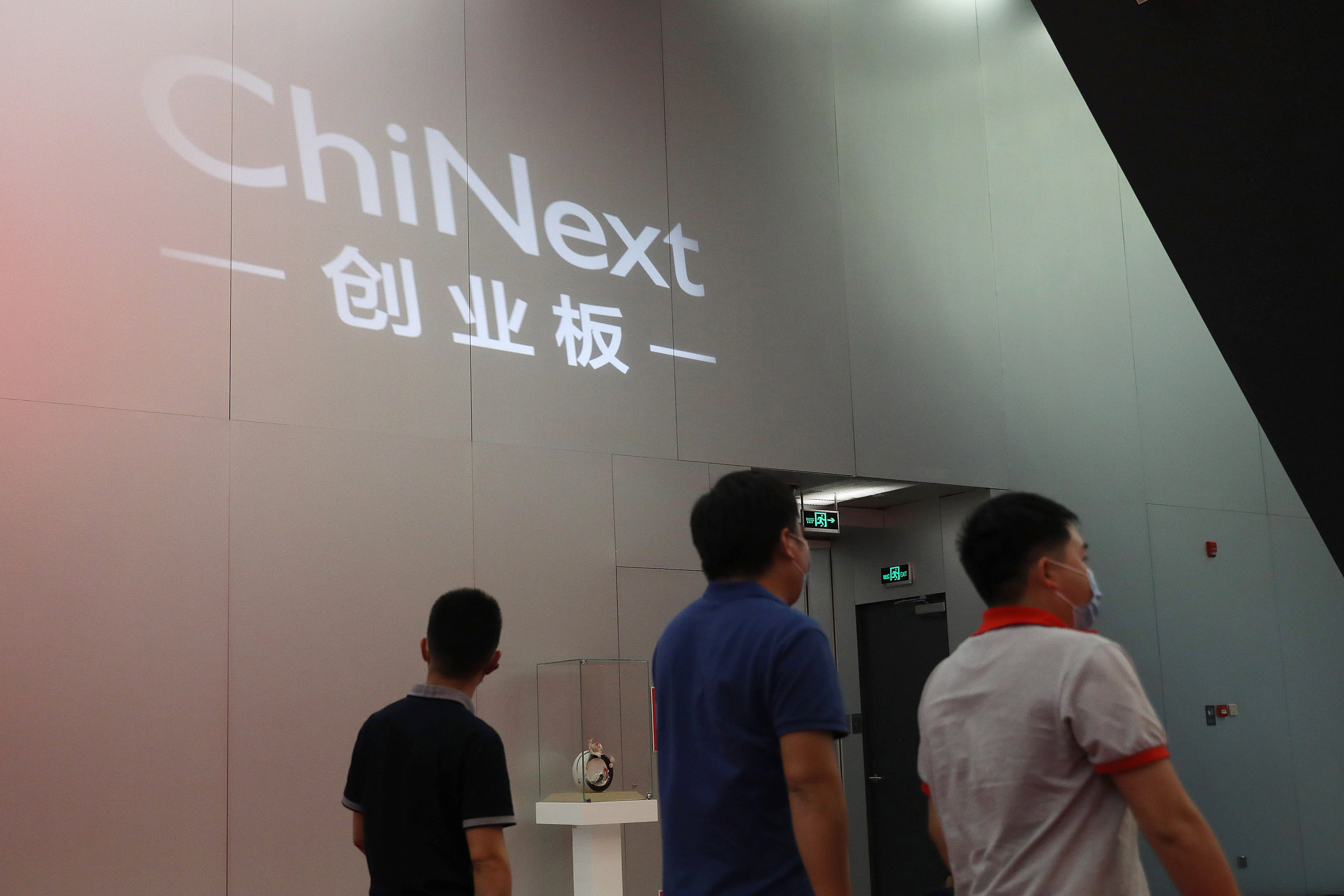
The inner view of Shenzhen Stock Exchange as the first batch of registration-based initial public offerings (IPOs) of 18 enterprises are about to debut on the ChiNext board on August 23, 2020 in Shenzhen, Guandong Province of China.
VCG | VCG via Getty Images)
SINGAPORE — As China continues to push toward further reforms in its financial markets, one of the changes the country made was to revamp listing rules for the ChiNext start-up board.
The move has benefited small and medium-sized businesses, as well as technology firms, according to Chaoping Zhu, a global market strategist at JPMorgan Asset Management.
“Based on the current development in the market, we find that it has been easier for companies to get listed in the stock market since the registration system was adopted,” Zhu told CNBC in an email.
“The major beneficiaries are SMEs (small and medium-sized enterprises) and innovative tech companies,” he said.
The pilot registration-based IPO system was adopted in June. Two months later, the first tranche of 18 companies successfully debuted on the ChiNext board — a Nasdaq-style tech-heavy board in Shenzhen.
The new system requires stricter disclosures and aims to improve market transparency as well as make equity financing easier for tech companies.
The reforms also cut down the IPO processing time by adopting a registration-based system as opposed to the previous system based on regulatory approval. The new rules are similar to those already adopted at the Shanghai Stock Exchange’s Star Market, which started trading in July 2019.
Companies now have “improved” visibility in their bid to go public as a result of the registration system, Ringo Choi, Asia-Pacific IPO leader at EY, told CNBC.
He said the timetable is now “more foreseeable” for firms, compared to the past where the timing was “very uncertain” and the queue to debut may be long.
“I’m very supportive for the new system,” he said, adding that he was “looking forward” to the implementation of the registration system for the whole Chinese market.
“The ChiNext reform has … laid the groundwork for implementing the system on the main board and the SME board that targets small and medium-sized firms,” Vice-Premier Liu He said on the day that 18 companies listed successfully under the new ChiNext rules, state media China Daily reported.
Wild market swings
Other reforms at ChiNext include extending the daily stock limit to allow for greater volatility. Stocks on the Shenzhen board can now gain or lose up to 20% in a single trading session, compared to 10% previously. New entrants are now also allowed to trade freely within the first five days of debut and will not be subject to price limits.
EY’s Choi said the revised approach allows market forces to “speed up” the process of company share prices reaching equilibrium based on demand or supply.
Still, the changes have resulted in wild gains observed among the first batch of firms that made their debut under the new system – with one company’s share price soaring more than 1,000% on the first day of trading.
In fact, the Shenzhen Stock Exchange (SZSE) itself intervened in September, announcing that it was halting the trading of several ChiNext-listed stocks after they rose “rapidly in a short term” despite having what it deemed “small circulation market capitalization, low prices, and poor fundamentals.”
Asked about the SZSE’s intervention, Choi said it was a “good reason” for the authorities to keep a close a close eye on companies which have seen unusual price fluctuations.
Mainland investors do not have as many investment opportunities as their counterparts elsewhere, Choi said, and as a result may put “quite a lot of money” into the market and leverage too much.
“If the change is too high, then they want to protect the investors and also they want to ensure the banking system will not be … heavily affected,” Choi said. For such situations, it is “reasonable” for the regulator to step in to ensure that investors are not falling into a “trap,” he added.
Stonehorn Global Partners’ Sam Le Cornu agreed with Choi, saying the intervention by the SZSE was “not unique” and allows investors to “stop and think.”
“I think it’s a good thing,” said Le Cornu, who is co-founder and CEO at the fund manager.
“China, the way that it’s approaching this, has learned a lot of lessons from 2015,” he added, in reference to the market volatility seen during that period.
As an investor in China for more than a decade, Le Cornu said: “I have more and more confidence that they’re moving in the right direction.”
— CNBC’s Evelyn Cheng contributed to this report.
Source: CNBC
